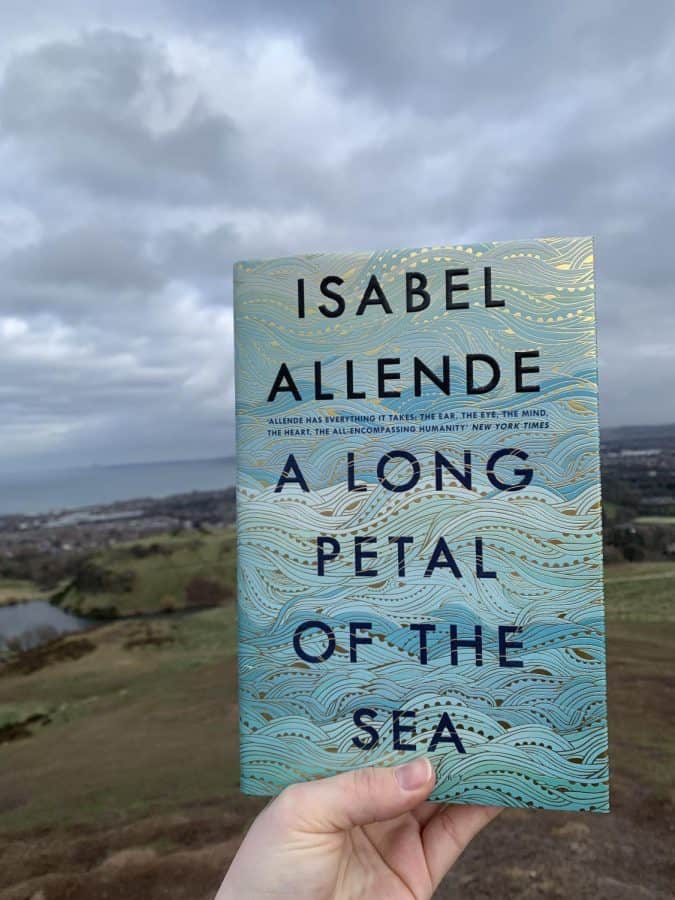From the Library: ‘A Long Petal of the Sea’ is the immigrant story ‘American Dirt’ couldn’t be
May 2, 2020
From the Library is a regular column reviewing New York Times Best Sellers.
Jeanine Cummins’s recent novel “American Dirt” quickly climbed to the top of the Best Seller list when it was released earlier this year. A tale following a Mexican family and their attempts to flee to the U.S. after being targeted by a drug cartel, the novel was highly anticipated and even earned a coveted spot in Oprah’s Book Club.
However, just as rapid as the rise of “American Dirt” to Best Seller status was the controversy that surrounded it. Jeanine Cummins, who at the novel’s release proudly claimed Puerto Rican heritage, had been calling herself white as early as 2016. The book’s publisher, Flatiron Books, used Cummins’ husband’s former status as an undocumented immigrant to give credbility to the novel – even though he immigrated from Ireland. Hundreds of people across social media platforms have called out Cummins’ depiction of the book’s Mexican family as “brown face,” the story contributing to the archaic rhetoric that white people need to save immigrants. Among countless other criticisms, the verdict was clear: “American Dirt” didn’t deserve the positive attention it received.
In sharp contrast, Isabel Allende’s “A Long Petal of the Sea” is a shining example of how to tell both the tragedy and beauty of having to leave behind everything you know for safety abroad.
Based on Allende’s own family’s experiences as well as those of her close friend on whom the main character of her book is based, “A Long Petal of the Sea” tells the story of Victor Dalmau, a Spanish doctor who is forced to flee Spain with his pregnant sister-in-law, a pianist named Roser, after the Spanish Civil War breaks out. The book follows their journey to Chile, where poet Pablo Neruda has promised them a safe haven, and the struggles and victories the pair experience as they try to adapt to life thousands of miles from what they’ve always known.
“A Long Petal of the Sea” is a fantastic story that gives a full-bodied view of the immigration experience. From detailing Victor’s time in concentration camps and Roser’s hard-fought attempts to reunite with her husband, to the couple acknowledging for the first time that Chile has become their new home and finding adopted family among the residents there, the book is a bittersweet account that will make you appreciate what home means so much more.
Allende’s language adds immensely to the story, braiding together quotes from the real-life poet Pablo Neruda, whom the character of the same name is based on, and a top-down, dollhouse style of writing reminiscent of classics like Gabriel García Márquez’s “One Hundred Years of Solitude.” Following Victor for the entirety of his life, Allende’s style helps bridge together the decades-worth of content and the multitude of people who Victor and Roser meet without the story feeling overwhelming in scale. Though sometimes Allende sacrifices character development for the sake of the long-term storytelling, the end product is a sweeping tale that, through it all, is an encompassing love story for the places in our lives.
When we think of immigration in the U.S., the things that come to mind are often imbued with political tug-of-war, families torn apart and an overwhelming sense of fear. Allende doesn’t ignore those parts of the experience, but “A Long Petal of Sea” highlights the unexpected brightness in finding home again. In so many of the pitfalls that American Dirt falls into – cliches, ignorance, taking away someone’s voice – “A Long Petal of the Sea” finds its strides, with veteran writer Allende making all the right choices. When looking for a story about leaving home, Allende delivers tenfold.
“A Long Petal of the Sea” deserves its place on the bestseller list without question – in fact, it deserves the place of “American Dirt” on the list, too. Amid the fears and loneliness that self-isolation has meant for people across the world, I would encourage picking up Allende’s latest hit and taking a page from its well-worn characters: this too shall pass.
Grade: A-











